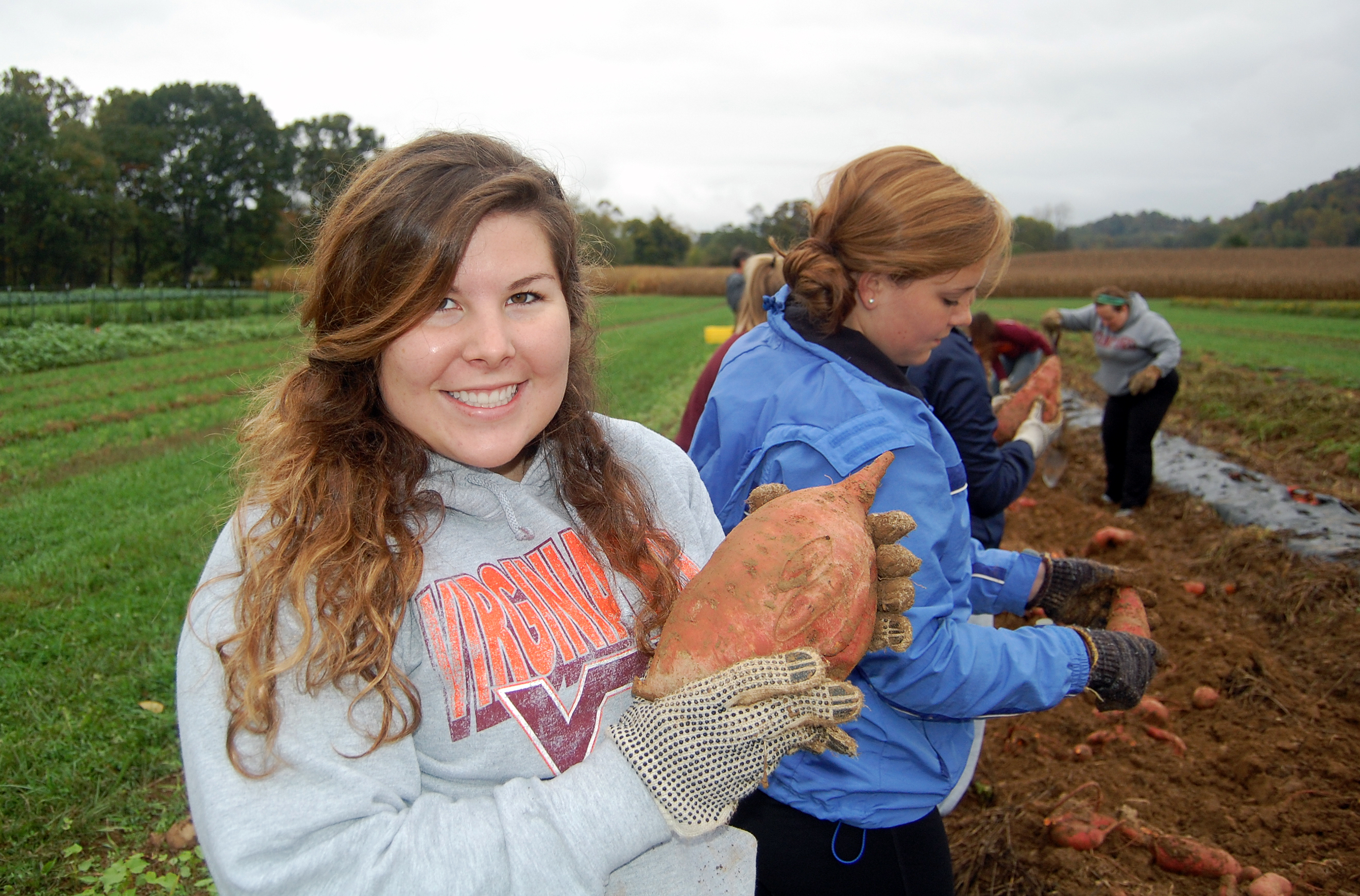Students volunteering with VT Engage connect with communities

What motivates students to climb on a bus on a Saturday afternoon to go work at a food warehouse? It’s not the pay; they are all volunteers. It’s not the praise, either.
For many of these students, the motivation comes from a place within them that says, “I have a responsibility to give to my community, just as my community gives to me.”
“We want to get our students really thinking about leadership in their communities,” says Gary Kirk, director of VT Engage: The Community Learning Collaborative at Virginia Tech. “We want them to realize that they have a role and responsibility in whatever community they are in.”
To aid in this learning process, VT Engage projects have a built-in component for introspection and discussion afterward.
Launched in fall 2012, Get on the Bus is one of dozens of VT Engage projects that offer a chance for students and community partners to work together to help serve community needs. Many address problems such as hunger and poverty, and many involve service-learning, which means the students’ volunteer work addresses learning objectives for a class.
“The concept is that our volunteers are getting something from the community and the community is getting something from our volunteers,” Kirk says. “We’re not coming in to take over a community project. We need to work alongside members of the community so that it’s a win-win for everyone.”
Kirk assumed the helm at VT Engage (formerly known as the Center for Student Engagement and Community Partnerships) in 2011 and, with a strategic planning team, began a process of redefining the organization and its goals. Through focused conversations with faculty, staff, students, and community leaders, the group decided a new name was needed to better reflect its mission.
In addition to collaboration and reflection, the group is also striving for deeper volunteer commitments.
“Volunteer service often takes the form of a one-day event or a requirement to complete a minimum number of hours, and volunteers don’t get that deeper connection,” Kirk says. “Our goal is to get people involved in more sustained commitments to their communities.”
Another area of emphasis for VT Engage is recognizing the opportunities for learning that come from service experiences. The group’s informal motto, Action-Reflection-Knowledge, serves to structure its programs and approach to promoting service.
For example, in Get on the Bus, students may find themselves working alongside community volunteers at a regional Feeding America warehouse, where large quantities of donated food are collected and distributed to food banks throughout Southwest Virginia. On the way home, students are encouraged to share in reflective conversations about the experience. Why are people living in poverty? What defines poverty versus privilege? What can I do to make an even bigger impact?
“Examining these issues can be a bit uncomfortable for some people,” Kirk says. “Because reflection is a critical component of most of the VT Engage projects, we try to give students a safe space to have those thoughts and conversations. That’s what makes the experience more than just another volunteer opportunity. We are really intentional about the process and the learning connection.”
Programs such as Get on the Bus are a gateway to more committed, long-term service. In fact, several participants have started their own trips to Feeding America and other service sites, Kirk says.
Another program VT Engage oversees is SERVE (Students Engaging and Responding through Volunteer Experiences), a residential learning community. Housed in Prichard Hall, the environment for first-year students fosters personal and civic growth. While studying community development and social change theory, SERVE students also carry out service experiences, including group projects and volunteering with local hunger-relief agencies.
They also take special sections of the university’s Exploring Citizen Leadership curriculum in which they explore what motivates them to do service and what they can realistically accomplish. Students interested in continuing in the program after the first year can hold leadership roles within SERVE and pursue a minor in leadership and social change.
Virginia Tech’s commitment to service is rooted in its culture as a public land-grant university.
“At VT Engage, we continually strive to define the meaning of service for students, faculty, alumni, and friends of the university,” Kirk says. “Individually and collectively, we understand that Ut Prosim (That I May Serve) is more than just a motto.”
Dedicated to its motto, Ut Prosim (That I May Serve), Virginia Tech takes a hands-on, engaging approach to education, preparing scholars to be leaders in their fields and communities. As the commonwealth’s most comprehensive university and its leading research institution, Virginia Tech offers 240 undergraduate and graduate degree programs to more than 31,000 students and manages a research portfolio of $513 million. The university fulfills its land-grant mission of transforming knowledge to practice through technological leadership and by fueling economic growth and job creation locally, regionally, and across Virginia.
Written by Catherine Doss.


